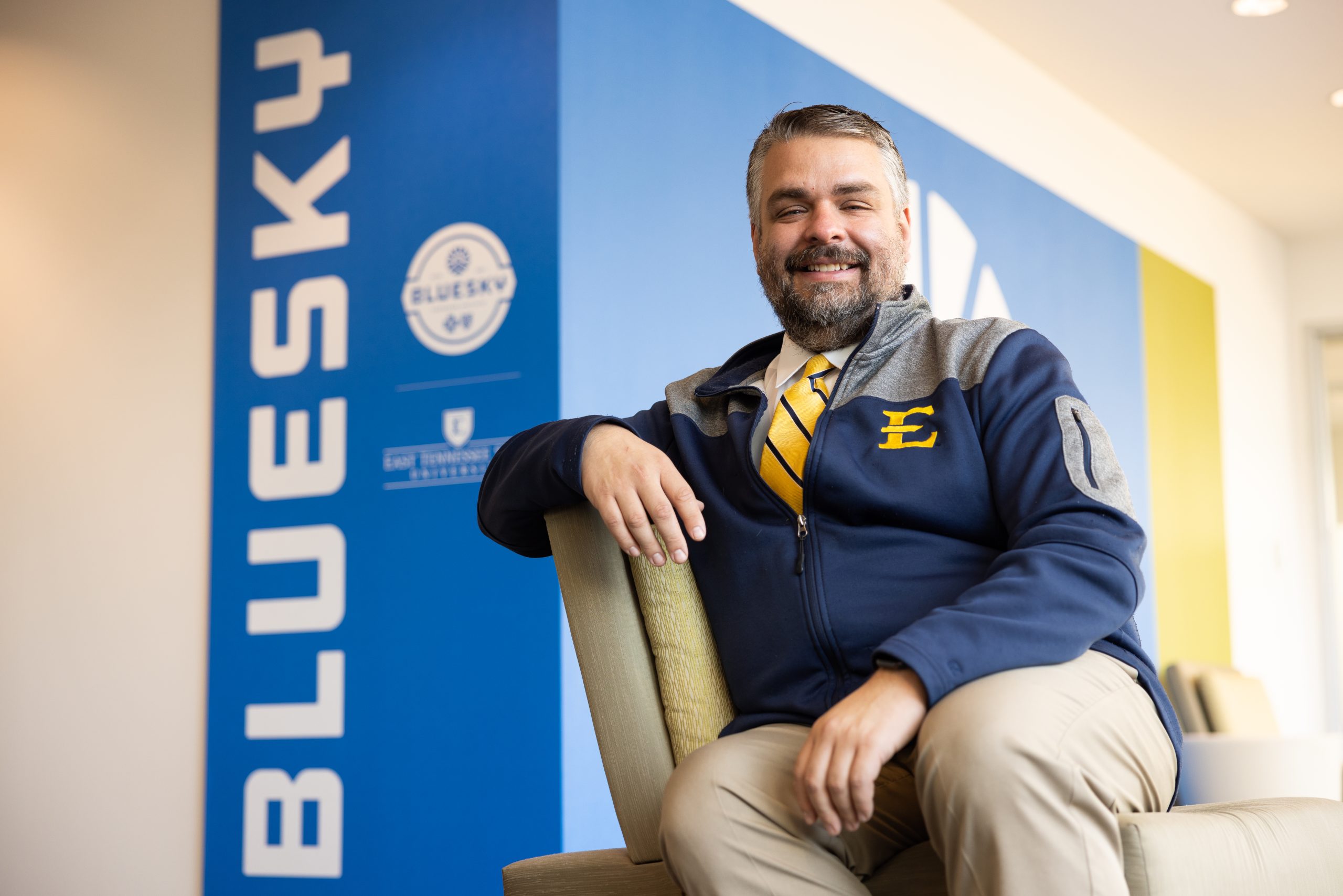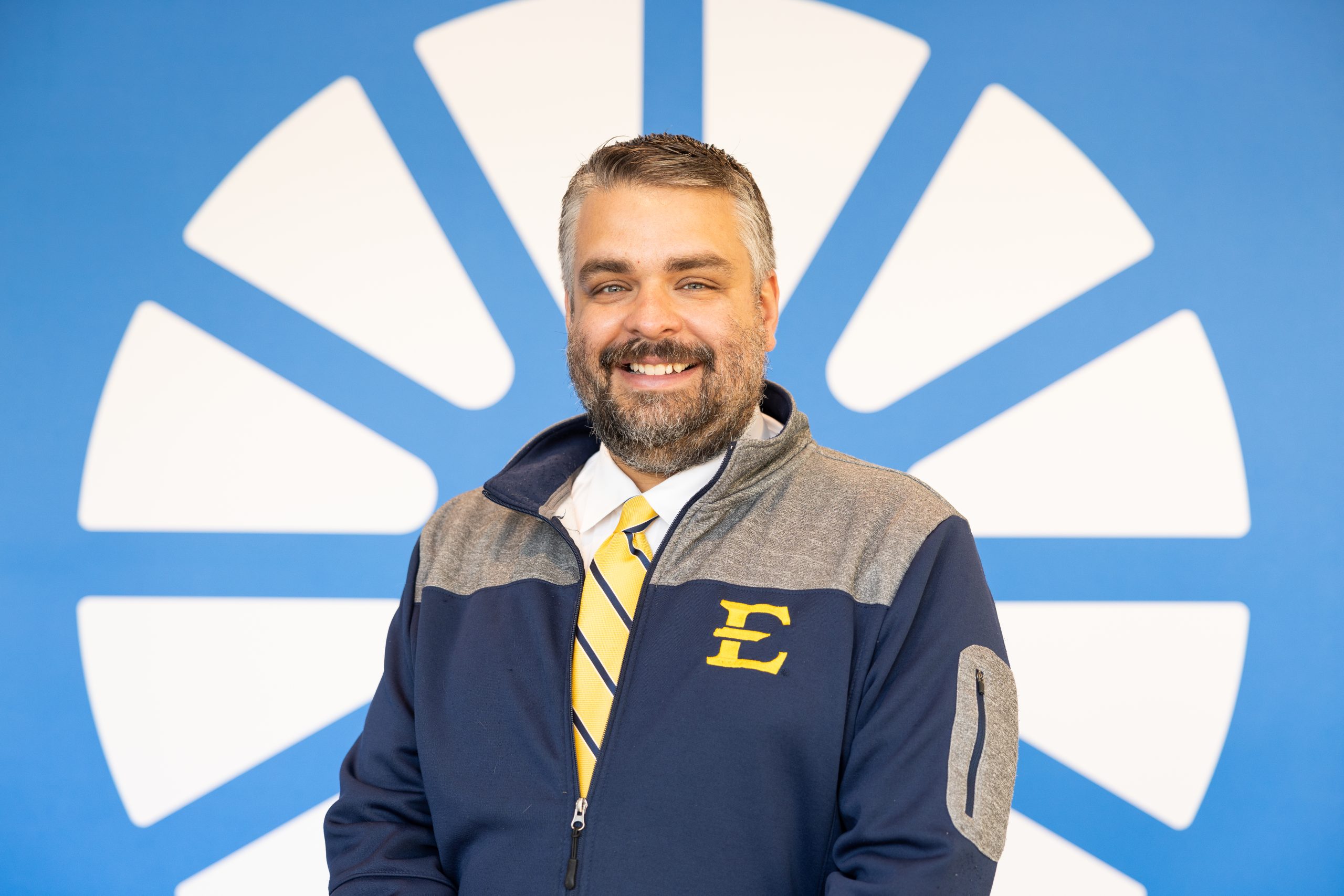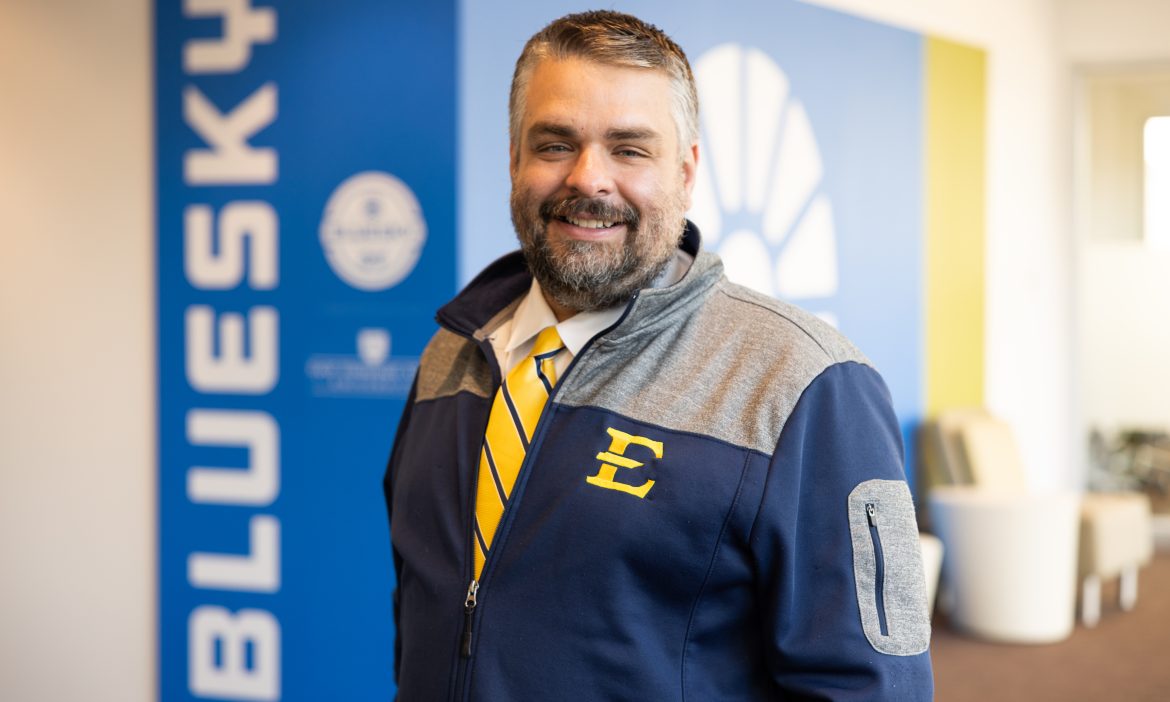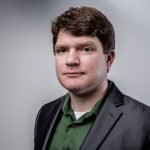Mathew Desjardins had a winding path to higher education and computing. His life experiences informed his college experience, which makes him an ideal fit for the BlueSky Tennessee Institute.
“Ultimately, I have a student-centric mind,” Prof. Desjardins says. “I try to center all of my decisions on what’s best for the student, decisions that will help them advance to where they want to be.”
We sat with Prof. Desjardins to discuss the program that offers a computing degree from ETSU in 27 months, the curriculum, and why technology now forms the basis for most post-college careers.
How did you find your way into higher education?
Desjardins: My journey was not traditional, even though I entered college right out of high school to study business. My parents said, “You need to go into computing.” I didn’t listen, and I wasn’t a stellar student. Business wasn’t the right fit, but more than that, I wasn’t ready. So I ended up dropping out.
I tell this story to students because it shows that we all go through failure in life — but failures are a chance to learn. I worked in the restaurant industry for years, getting promoted and having a management career but without a college education.

I enrolled at ETSU in 2010 and became deeply involved with the university. I worked in the Student Life and Enrollment office and became interested in giving students chances, just like I’d been given a second chance.
I found a knack for teaching, especially students at the freshman level. I went on to graduate school, became an academic advisor, and then a lecturer. So I was equipped with the student life and academic pieces to advise students. I try and help them realize that mistakes are about learning, and that they shouldn’t give up like I did the first time around.
You’re based in Chattanooga with BlueSky Institute students. Have you adjusted to being away from the ETSU campus?
Yes, but I like that change. I miss my campus, but I’m trying to bring that college way of life down here.
“When BlueCross accepted ETSU’s proposal to be partners, I said, “I want to go to Chattanooga, because I understand what students go through.” I understand the spectrum of the university — academics, student life, the administrative side, etc.”
I travel back to Johnson City most weekends. College is about creating community, and I have my community in Chattanooga, and I’m keeping my community alive back home. Online tools like Zoom help, but there’s something special about sitting face to face with somebody. Those little one-off conversations can spring new ideas. But I love that ETSU is now part of the Chattanooga and BlueCross communities.
What makes ETSU and BlueCross ideal partners?
At ETSU, we understood the BlueCross business need for viable job candidates in the tech field, and BlueCross understood the value that we can bring in terms of expertise and training. Our programs are accredited in computing, but fundamentally, a university’s ability to educate and create change is done through curriculum.

I chair ETSU’s College of Business and Technology curriculum committee and understand that we can’t keep teaching the same things over and over again; we have to adapt to the times and the needs of businesses. So I think that’s what makes this partnership work; we were able to say, “We see that you have needs. Let’s see how we can adapt to your needs.”
Regarding the coursework, how are we making a bachelor’s degree in 27 months a reality?
“We’re not speeding anything up and we’re not cutting anything out. The computing degree we’re offering is the same degree offered at ETSU’s main campus; it’s really just working harder in a streamlined fashion.”
This is a no-break degree.
Now, what did we do? We ensured courses aligned. As an academic advisor I looked at the coursework and put courses together that made sense. That means that in some semesters, students are pulling 19 credit hours, which is a hard semester, I won’t lie. But we’ve also added summer semesters. And we gave some courses as internship credits, so students will work in BlueCross in different departments to gain hands-on experience that ETSU doesn’t cover.
How are in-person and online classes determined?
We have faculty in Chattanooga teaching all computing classes in-person. We’re hiring more as students matriculate further into the program. This program offers required courses like math, English and the sciences. If we hired faculty for all of those, we’d need an entire floor of a BlueCross building. So those are virtual classes. But there are still projects, papers, and lab work associated with those courses.
How is your work with BlueSky Institute different from what you did at ETSU?
This is a new paradigm. If I were on ETSU’s main campus, I’d have 300 students I’d see for a couple of hours every week.
“With BlueSky Institute, I’m around these students from 8 to 4 every weekday. I’m constantly interacting with them and building those relationships. I can connect with them on a different level.”

The biggest frustration for faculty is having to ask, “Why are you not coming to me for help?” With BlueSky Institute, there’s no excuse for that.
“Students should be able to come to me and say, “I don’t understand this.” And part of my job is to build that trust.”
What does success for this program look like for you?
Success for me is graduating as many students who want to be here. To be realistic, slightly more than 50% of college enrollees actually finish. So Student Success Manager Melissa Graham and I will not only work together to make sure we have everything covered from an academic standpoint, but that we’re working with students on everything from the social aspect of the college experience to crisis management. We’re creating an environment and an experience that we hope will keep all 32 students engaged for all 27 months of the program.
What’s your elevator pitch for BlueSky Institute?
I have a couple of different ones [laughs].

If you want a true, almost one-to-one relationship with educators, if you want to build relationships with people who have knowledge to be passed on to you, and if you want to learn with a group of students who are likely going to become like family, BlueSky Institute is for you.
If you like a very structured day to help guide you through your college career, everything here is very prescriptive. “This is when we do this, this is when we do that.”
If you’re wavering because you don’t like taking things at a certain time, think about BlueSky Institute in terms of, “If you can handle structure for a few years, guess what, you’re getting graduate pay faster, you’re getting into your career faster, which then may open up other doors for you.”
“For those unsure about tech, remember — every job has some tech in it. Those with computing degrees can become librarians, accountants, nurses, astronomers, etc. There are definitely opportunities for students who may think they have no interest.”
If you have any inkling of interest in this program, I encourage you to reach out to our recruitment coordinator, visit us here on site and take a tour, come talk to me, or sit in one of my classes. I know the stereotype for computing majors is that they’re all looking to become video game developers, but there’s way more to it. If you don’t want stagnation, tech’s the way to go, because it’s always changing.

We focus on programming here, but there’s so much more to it. And if you get past programming, just to understand problem-solving and logic, you can do anything you want.
Interested in applying for BlueSky Tennessee Institute? Learn more here.


 Jesse joined the BlueCross BlueShield of Tennessee corporate communications team in 2017. A Chattanooga native, he has more than 15 years’ experience in content creation, management, and strategy for consumer audiences, including a six-year stint in health care marketing.
Jesse joined the BlueCross BlueShield of Tennessee corporate communications team in 2017. A Chattanooga native, he has more than 15 years’ experience in content creation, management, and strategy for consumer audiences, including a six-year stint in health care marketing.